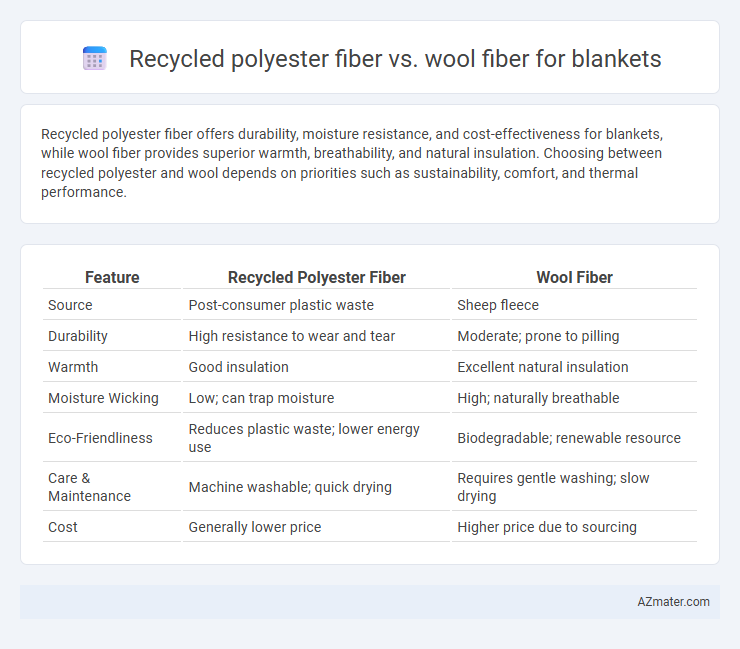Recycled polyester fiber offers durability, moisture resistance, and cost-effectiveness for blankets, while wool fiber provides superior warmth, breathability, and natural insulation. Choosing between recycled polyester and wool depends on priorities such as sustainability, comfort, and thermal performance.
Table of Comparison
| Feature | Recycled Polyester Fiber | Wool Fiber |
|---|---|---|
| Source | Post-consumer plastic waste | Sheep fleece |
| Durability | High resistance to wear and tear | Moderate; prone to pilling |
| Warmth | Good insulation | Excellent natural insulation |
| Moisture Wicking | Low; can trap moisture | High; naturally breathable |
| Eco-Friendliness | Reduces plastic waste; lower energy use | Biodegradable; renewable resource |
| Care & Maintenance | Machine washable; quick drying | Requires gentle washing; slow drying |
| Cost | Generally lower price | Higher price due to sourcing |
Introduction to Recycled Polyester and Wool Fibers
Recycled polyester fiber is made from post-consumer plastic bottles and industrial polyester waste, offering durability, moisture resistance, and eco-friendly benefits through reduced reliance on virgin materials. Wool fiber, sourced from sheep, provides natural insulation, breathability, and moisture-wicking properties, making it a premium choice for warmth and comfort in blankets. Both fibers present unique environmental and functional advantages, with recycled polyester emphasizing sustainability and wool emphasizing natural performance.
Environmental Impact: Polyester vs Wool
Recycled polyester fiber significantly reduces environmental impact by utilizing plastic waste, lowering greenhouse gas emissions and conserving natural resources compared to virgin polyester production. Wool fiber, as a natural, biodegradable material, supports carbon sequestration in soil and is renewable but involves resource-intensive livestock farming, including water use and methane emissions. Choosing recycled polyester blends can minimize landfill waste and energy consumption, while wool offers sustainability through biodegradability and longevity, making the environmental impact dependent on sourcing and lifecycle management.
Comfort and Softness Comparison
Recycled polyester fiber provides a smooth, lightweight texture with excellent moisture-wicking properties, making blankets highly breathable and quick-drying, ideal for sensitive skin. Wool fiber offers superior natural insulation and a plush, warm feel, with inherent elasticity that enhances comfort by conforming to body contours. While wool is often softer and cozier due to its natural crimp, high-quality recycled polyester blends can closely replicate this softness while offering hypoallergenic benefits.
Durability and Longevity of Blankets
Recycled polyester fiber offers exceptional durability and resistance to wear, making blankets long-lasting and less prone to shrinking or stretching compared to wool fibers. Wool fibers provide natural resilience and elasticity but may degrade faster with frequent washing and abrasion. The synthetic nature of recycled polyester ensures greater longevity for blankets in high-use environments, while wool blankets require more careful maintenance to preserve their durability.
Warmth and Insulation Properties
Recycled polyester fiber offers excellent moisture-wicking and quick-drying properties, enhancing its insulation efficiency by retaining warmth even when damp, making it ideal for blankets in humid conditions. Wool fiber naturally provides superior thermal regulation through its crimped structure, trapping air to maintain consistent warmth and breathability, which excels in colder environments. Both fibers deliver effective insulation, but wool typically outperforms recycled polyester in long-term heat retention and moisture management.
Moisture Wicking and Breathability
Recycled polyester fiber offers superior moisture-wicking capabilities compared to wool fiber, efficiently drawing sweat away from the skin to keep the blanket dry and comfortable. Wool fiber inherently provides excellent breathability by allowing air circulation and natural moisture absorption, enhancing temperature regulation. While recycled polyester excels in quick drying and moisture management, wool's natural breathability and odor resistance create a balanced choice for temperature-controlled comfort.
Allergy and Skin Sensitivity Factors
Recycled polyester fiber in blankets offers hypoallergenic properties and resists moisture, reducing the risk of skin irritation and allergic reactions, making it ideal for sensitive skin. Wool fiber, while natural and breathable, contains lanolin that can trigger allergies and itchiness in individuals with sensitive skin. Choosing recycled polyester fiber blankets supports comfort for allergy-prone users by minimizing exposure to common irritants found in wool.
Maintenance and Care Requirements
Recycled polyester fiber blankets require minimal maintenance, featuring high durability, resistance to wrinkles, and easy machine washability without special detergents. Wool fiber blankets need more careful handling, including gentle washing, air drying, and occasional brushing to maintain softness and prevent shrinkage or felting. The moisture-wicking and natural insulation properties of wool also demand protection from moth damage through proper storage.
Cost Considerations: Affordability and Value
Recycled polyester fiber offers a more affordable option for blankets compared to wool fiber, making it an attractive choice for budget-conscious consumers. Wool fiber, while generally more expensive, provides superior natural insulation and durability, often justifying its higher initial cost with long-term value. Consumers seeking cost efficiency without sacrificing warmth may prefer recycled polyester, whereas those prioritizing longevity and natural materials tend to invest in wool blankets.
Sustainability and Ethical Production
Recycled polyester fiber for blankets offers a sustainable alternative by reducing plastic waste and lowering carbon emissions compared to virgin polyester production, while wool fiber is biodegradable and renewable but raises concerns about animal welfare and land use impact. Ethical production of recycled polyester involves transparent recycling processes and reduced reliance on petroleum, whereas wool requires responsible shearing practices and humane treatment of sheep. Both materials contribute to sustainability goals, with recycled polyester excelling in waste reduction and wool providing natural fiber benefits when sourced ethically.

Infographic: Recycled polyester fiber vs Wool fiber for Blanket
 azmater.com
azmater.com